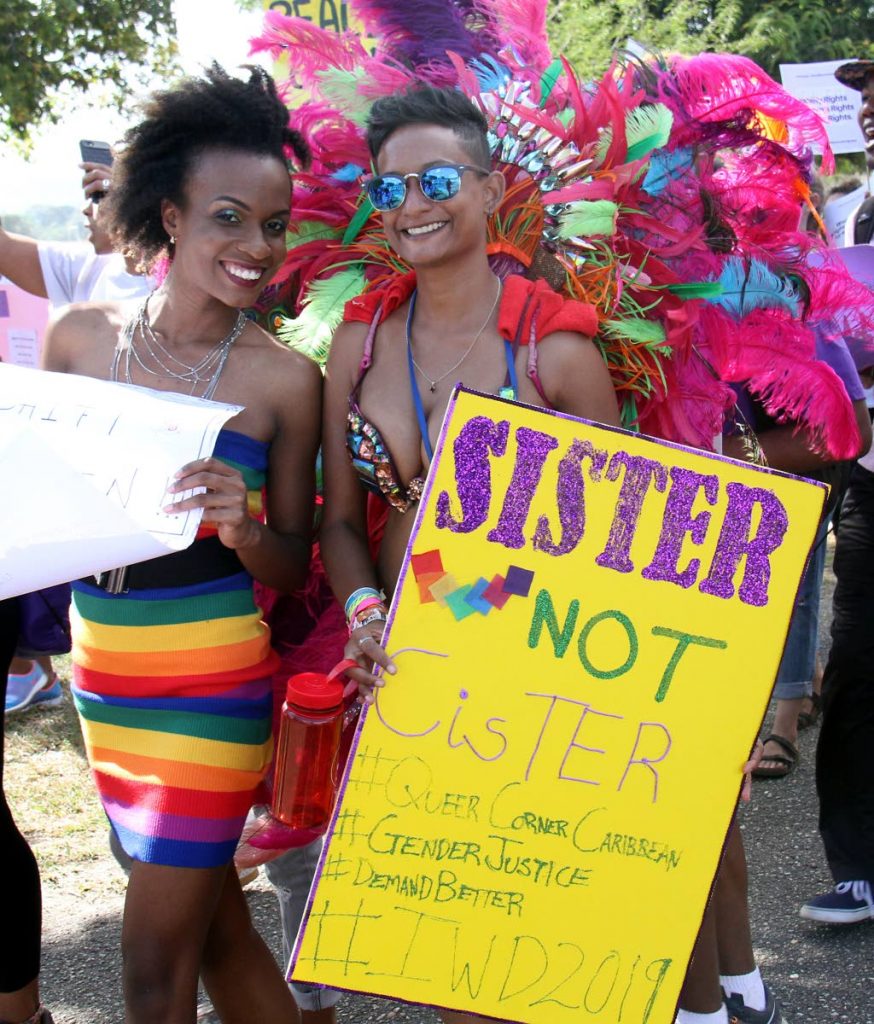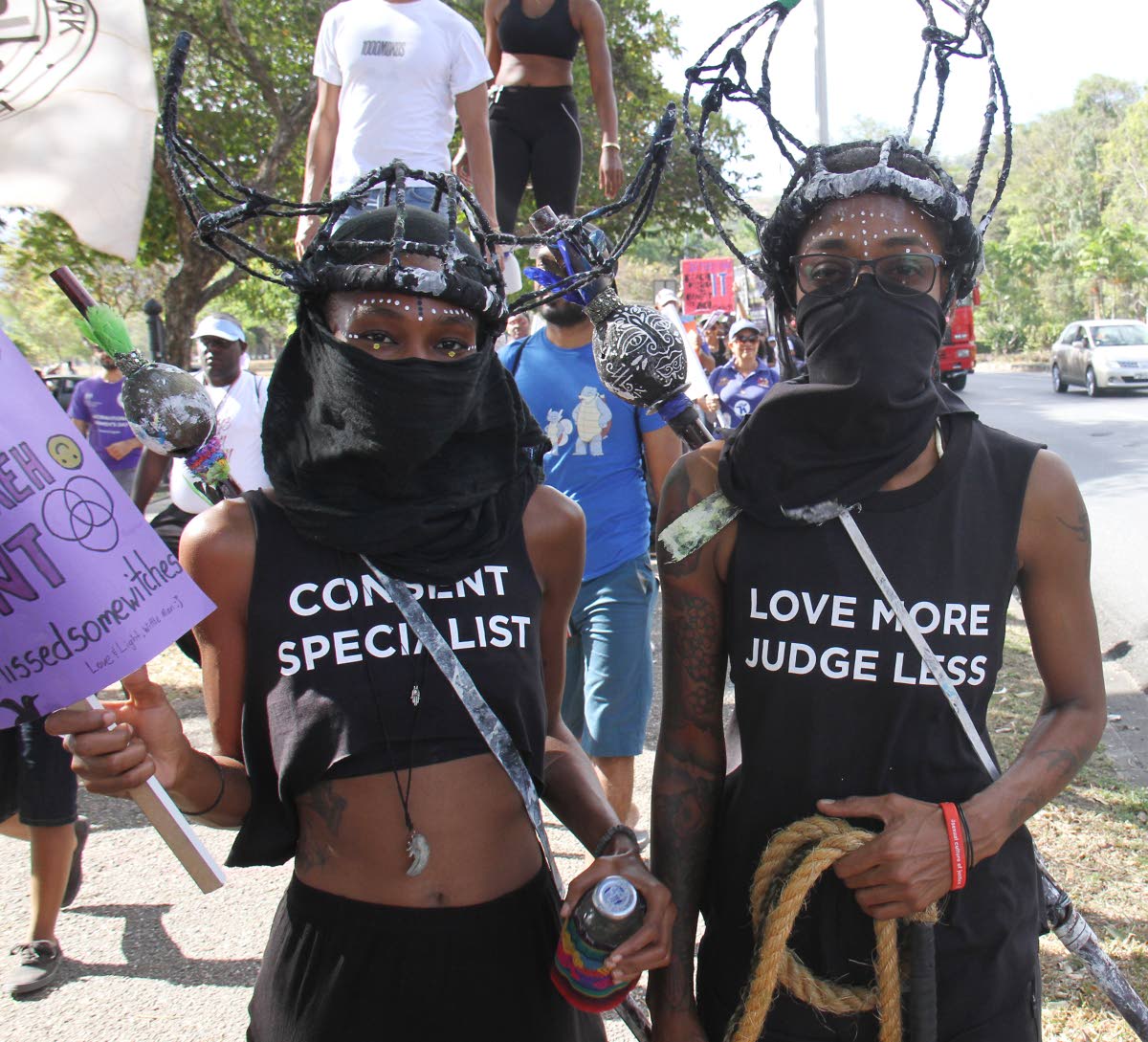March of the sisterhood

Nevertheless, they persisted. Scores of women came out in solidarity and support of one another for the third annual Women’s Rights Rally and March at the Queen’s Park Savannah, Port of Spain yesterday, some in their recycled Carnival costumes, several with placards and all with one mission: to demand gender equality.
“The turnout is fantastic considering it’s so close to Carnival. We were worried that fewer people might come out because of how close it was,” Dr Angelique Nixon told Newsday. Nixon, a lecturer at the UWI Institute for Gender and Development Studies, was one of the organisers of the event, along with CAISO: Sex and Gender Justice, CEDAW Committee of TT, Fire Circle TT, the Network of NGOs, WOMANTRA and Women Working for Social Progress.
The theme of this year’s march was Demand Better, playing off the International Women’s Day (March 8) theme of Balance for Better. Among those demands, an end to gender-based and sexual violence. “There are a lot of people doing work but we need everyone, men especially, to speak out against gender based violence,” she said, adding that the society needed “a lot of healing and a lot transformation” because of the norms around sex and gender is a part of a lot of the violence and the problems the country faces.
Between 60 and 70 per cent of people who are abused don’t report it, she said, citing a recent report facilitated by UN Women on TT released last year. “There’s shame and stigma why people stay in intimate partner violence. (This march is about) refusing silence and demanding space and standing up against sexual harassment in streets, homes and workplaces,” she said.
The Women’s March organisers have also partnered with religious organisations to help bring an end to gender-based violence, something Sr Marie-Therese, a TT-born, Roman Catholic nun based in Boston, was very happy about. “In the states I support women’s rights, equal rights, just wages, and paid family leave so I’m really glad to see this happening here in TT. I’m really pleased to see those working against domestic violence are also working with religious bodies to see the intersection on how we can work better to protect and respect women and children. I think it’s important wherever we are in the world to stand up for women and it’s good to see men here supporting us,” she said.
Also on the schedule was an information fair for people wanting more information on women’s rights and activists groups in TT, as well as spoken word performances, including a riveting portrayal of by actress Cecelia Salazar, who told the story of Gene Miles, one of the most prominent whistleblowers in TT history, who first revealed possible corruption for gas station contracts in the 1960s and was publicly vilified and shamed, but is now remembered for being a hero and patriot.
And the march was not just for women, by women. Several allies showed up, eager to show their support for the cause. Among them attorney Douglas Mendes, SC, who told Sunday Newsday he tries to come to the march every year. “I believe in gender equality and people call me a feminist. I have daughters and I want to ensure they are treated equally in this world.”
Another man, who declined to give his name, said he just happened to be in the savannah with his young son and was curious so he came over to see what was happening. “I didn’t know what it was, but I stayed so he could see what is happening. It’s good for him to have this exposure.”
Felipe Alexander, who identifies as a queer man, said he came because he believes in equal rights for all women, especially transgender women, who had a bad year last year. “I support all people, men, women and even those who are non-conforming. As an ally, I’ve had a lot of women in my life and I think what society says about women needs to be broken down and I will fight for all my female friends for some level of equality,” he said.
Stephen Dookeran, who is deaf, said he and his friends were part of Dretchi, the local association for the deaf and hearing impaired, and came out to join other NGOs to celebrate International Women’s Day. “We need more deaf and hard of hearing people to march and communicate, and stand up for human rights and stand up for their rights,” he told Sunday Newsday through a sign language translator.
Renelle White, lecturer, activist and feminist, said as long as she is able, she will never miss the women’s march. “It’s for women and girls who are disadvantaged and oppressed, bodily and physically. It means so much to be present and show your bodies, to actually walk and take up public space in the world. And there is no better place this year than the savannah grass,” she said.
She showed off her sign: “Tu’n up, free up. Demand justice on the savannah grass on your own stage!” “We are being visible. It’s about reclaiming your right and your space in your body and right here in society. Because when women feel empowered to claim their bodies and themselves and their spaces they are empowered to make better decisions, understand consent, and call out men on their privilege and entitlement. So we can all come together to bu’n down the patriarchy!”



Comments
"March of the sisterhood"